#Le Verrou (The Bolt)
Text
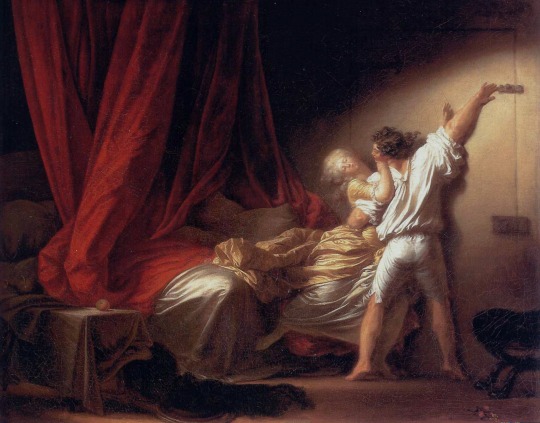
31 notes
·
View notes
Text
Depuis le départ, il avait, disait-il, dans la famille du banquier, où l’on avait bien voulu le recevoir comme un fils, il avait trouvé toutes les garanties de bonheur qu’un homme doit toujours rechercher avant les caprices de la passion, et, quant à la passion elle-même, il avait eu le bonheur de la rencontrer dans les beaux yeux de Mlle Danglars.
He acknowledged the extreme kindness which had been shown him by the banker’s family, in which he had been received as a son, and where, besides, his warmest affections had found an object on which to centre in Mademoiselle Danglars.
Since this departure, he said, the banker had been kind enough to welcome him into his family like a son and there he had found all those guarantees of happiness that a man ought to look for in preference to the vagaries of passion; though, as far as passion was concerned, he had been fortunate enough to encounter it in the eyes of Mlle Danglars.
(Apparently, you couldn’t be passionate in the old days, only warmly affectionate. Though I notice both translators appear to have passed up an opportunity to remark on Mlle Danglars’ fine eyes.)
—C’est après-demain que j’ai quelque chose comme quatre mille francs à toucher chez vous; mais le comte a compris que le mois dans lequel j’allais entrer amènerait peut-être un surcroît de dépenses auquel mon petit revenu de garçon ne saurait suffire, et voici un bon de vingt mille francs qu’il m’a, je ne dirai pas donné, mais offert. Il est signé de sa main, comme vous voyez; cela vous convient-il?
—Apportez-m’en comme celui-là pour un million, je vous les prends, dit Danglars en mettant le bon dans sa poche. Dites-moi votre heure pour demain, et mon garçon de caisse passera chez vous avec un reçu de vingt-quatre mille francs.
“That the day after to–morrow I shall have to draw upon you for about four thousand francs; but the count, expecting my bachelor’s revenue could not suffice for the coming month’s outlay, has offered me a draft for twenty thousand francs. It bears his signature, as you see, which is all–sufficient.”
“Bring me a million such as that,” said Danglars, “I shall be well pleased,” putting the draft in his pocket. “Fix your own hour for to–morrow, and my cashier shall call on you with a check for eighty thousand francs.”
“The day after tomorrow I am to draw something like four thousand francs on your bank, but the count realized that the coming month might bring an excess of expenditure which would not be covered by my small bachelor’s income, so here is a bill for twenty thousand francs which he gave me, more as a present than as a contribution to expenses. It is signed by him, as you see. Will that do?”
“Bring me one like this for a million and I’ll cash it for you,” said Danglars, putting the bill into his pocket. “Give me a time tomorrow, and my cashier will come to you with a bond for twenty-four thousand francs.”
(It’s expensive being engaged to a millionaire’s daughter, is what I’m getting from this. Though perhaps only (20+4) thousand francs worth of expensive, and not (20x4) thousand.)
«Ah! tu es exact», dit-il.
Et il tira les verrous.
«Parbleu!» dit Andrea en entrant.
Et il lança devant lui sa casquette de livrée qui, manquant la chaise, tomba à terre et fit le tour de la chambre en roulant sur sa circonférence.
“Ah, you are punctual,” said he, as he drew back the door.
“Confound you and your punctuality!” said Andrea, throwing himself into a chair in a manner which implied that he would rather have flung it at the head of his host.
“You’re punctual,” he said, drawing back the bolts.
“Damnation!” said Andrea, going in and throwing his livery cap ahead of him. It missed the chair, fell to the floor and rolled round the room on its edge.
(I don’t know what to make of this, unless there are different versions of the French text.)
Andrea sentit en effet, en respirant, une odeur de cuisine dont les arômes grossiers ne manquaient pas d’un certain charme pour un estomac affamé, c’était ce mélange de graisse fraîche et d’ail qui signale la cuisine provençale d’un ordre inférieur; c’était en outre un goût de poisson gratiné, puis, par-dessus tout, l’âpre parfum de la muscade et du girofle.
Andrea, indeed, inhaled the scent of something cooking which was not unwelcome to him, hungry as he was; it was that mixture of fat and garlic peculiar to provincial kitchens of an inferior order, added to that of dried fish, and above all, the pungent smell of musk and cloves.
Breathing in, Andrea could indeed detect the smell of cooking, its gross odours not without charm for a hungry stomach: there was that mixture of fresh oil and garlic which indicates the inferior breed of provençale cuisine, with additionally a hint of breaded fish and, above all, the acrid scent of nutmeg and cloves.
(I have to say, the newer translation sounds more appetizing.)
Celui-ci sembla prendre son parti, déboucha bravement les bouteilles et attaqua la bouillabaisse et la morue gratinée à l’ail et à l’huile.
The latter seemed to have resigned himself; he drew the corks, and partook largely of the fish with the garlic and fat.
The latter seemed to resign himself to making the best of it, bravely uncorking bottles and tucking into the bouillabaisse and the cod in breadcrumbs with garlic and oil.
(Much more appetizing.)
Eh! mon ami, la fortune est inconstante, comme disait l’aumônier... du régiment.
Well, my friend, fortune is inconstant, as the chaplain of the regiment said.
Well, my friend, fortune is a fickle jade, as the regimental... chaplain said.
(This is like a demonstration of how a meaningful pause can change a sentence. No pause, he’s just talking about the regimental chaplain. Pause before “regiment”, and perhaps it was a chaplain somewhere else, such as that place he avoids naming where he and Benedetto became acquainted. Pause before “chaplain”, and it’s a very different suggestion about what detail he’s avoiding – and one which, if it were in the original text, the Victorian translator definitely wouldn’t have approved of.)
—Eh bien, on se souviendra des amis; je ne te dis que ça.
—Oui, comme tu as bonne mémoire, justement!
—Que veux-tu? je croyais que tu voulais me rançonner.
“I shall remember old friends, I can tell you that.”
“Yes, since you have such a good memory.”
“What do you want? It looks as if you were trying to fleece me?”
“I’ll remember my friends. I shall say no more.”
“Yes, and you have such a good memory, too.”
“What do you expect? I thought you wanted to turn me in for the reward.”
6 notes
·
View notes
Text
verrou
verrou
/vɛʀu/
masculine noun
(général) bolt; (à bouton) deadbolt; (à clé) deadlock
verrou 3 points multilock
mettre le verrou to shoot the bolt
pousser or tirer le verrou (fermer) to shoot the bolt; (ouvrir) to draw the bolt
fermer [qch] au verrou to bolt [fenêtre, porte]
Composés
verrou haute sécurité
high security door lock
verrou de sûreté
double security lock
Idiomes
être sous les verrous
to be under lock and key
mettre or placer qn sous les verrous
to put or place sb under lock and key, to lock sb up
faire sauter un verrou
to overcome an obstacle
0 notes
Text
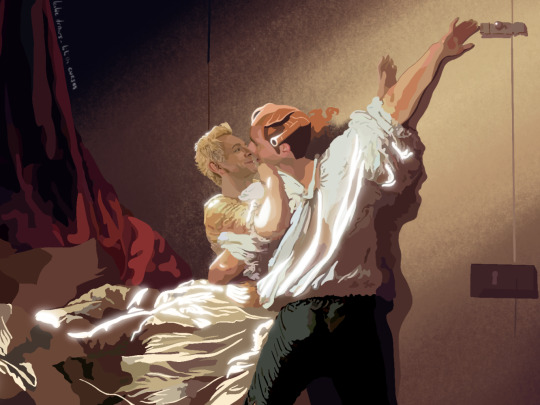

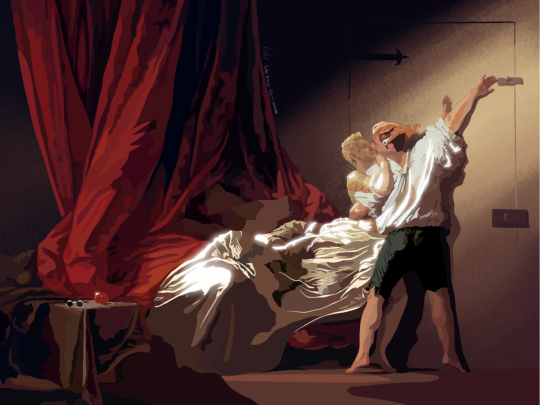
What happened after the Bastille?
The original painting 'Le verrou' (The Bolt) by Fragonard is an absolute fav of mine. So I had to pay a proper tribute to this lovely painting. I named my rendition 'Paradis clandestin' (I don't think it needs translating?)
However, if there's a thing that I don't like in the original work, it's the dubious consent that is conveyed between the two characters. It's actually open to interpretation but I'd rather make it clear in my version, so I drew a very happy, very consenting Azi.
✪ Consent is everything ✪
What I've always loved in this painting's composition is that it is all built around a diagonal line, from the apple, to the movement of the bed sheets, of the bodies, up to the bolt in the light... Lovely. I added Crowley's glasses next to the apple OF COURSE.
This fanwork is available to download as a wallpaper in HD quality by the way :) and so is 'Le ravissement de l'ange' previously posted on my Tumblr.
You can find them on my Gumroad against a wee participation.
Hope you enjoy this new piece, I've got a few more surprises left for you...
380 notes
·
View notes
Text
Lock and Key Vocab
la serrure- lock
le verrou- lock
la serrure à pêne dormant- dead bolt
la sécurité enfant- child safety lock
le cadenas- padlock
la clé- key
le passe-partout- skeleton key
sous clé- under lock and key
verrouillé.e- locked
enfermé.e- locked up (as a person)
ouvrir- to open
fermer- to close
verrouiller- to lock
déverrouiller- to unlock
cadanaser- to padlock

#lock#key#lock and key#french#france#français#french language#French Vocabulary#french vocab#vocab#vocabulary#vocab list#vocab anglais#learning french#learning#learning languages#learnfrench#language#languages#language learning#langblog#french langblr#langblr#french langblog#study french#studystudystudy#study#studyblr
58 notes
·
View notes
Photo
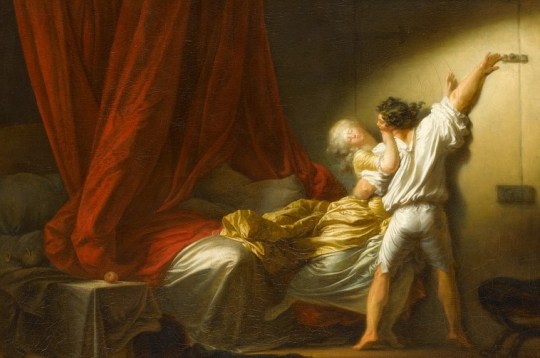
The Bolt (French: Le Verrou), also known as The Lock, by Jean-Honoré Fragonard
2 notes
·
View notes
Photo
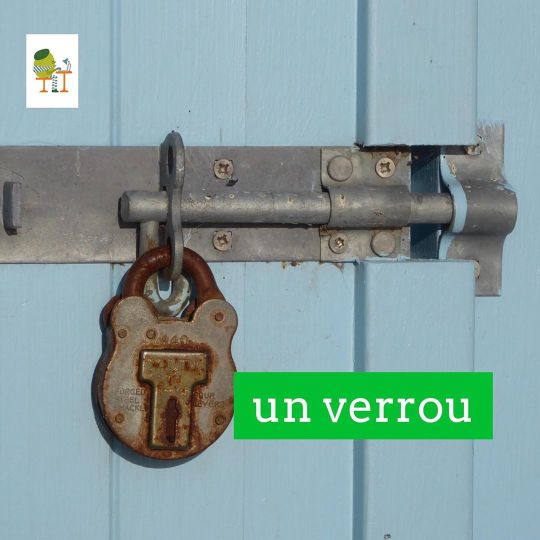
LE MOT DU JOUR un verrou [ veʀu ] bolt #ALK #learnFrench #vocabulary #oneaday (at Arnaud's Language Kitchen) https://www.instagram.com/p/CFrJ-6XHj3X/?igshid=198v7hgaenrym
0 notes
Text
Oh my god I’m cracking up
This is from Claretie’s bio/critique of Petrus Borel , re: Madame Putiphar:
On peut trouver dans le Journal des Débats un article fort violent de M. Jules Janin sur ce livre. Le futur auteur des Gaîtés champêtres, amoureux des séductions soyeuses du XVIIIe siècle, ne pouvait agréer, on l'avouer a, ce XVIIIe siècle dè verrous et de bastilles que lui présentait l'auteur de Madame Putiphar. “Si je parle de votre livre”, dit il à Pétrus Borel qui lui demandait un article, “je le comparerai tout simplement aux œuvres du marquis de Sade.”
“Comparez” dit Pétrus.
Jules Janin ne se le fit pas dire deux fois. Lorsque M. Bertin vit l'article en question. “Holà! Jules, dit-il au critique, tu veux donc que nous ayons un procès ?”
“Nous n'aurons pas de procès,” répondit Jules Janin. “L'auteur le veut ainsi.” “Étrange auteur!” fit -M. Bertin.
I keep trying to summarize but it’s too funny , translation under the cut:
"Compare." said Petrus.
Jules Janin did not make him say it twice. When Mr. Bertin saw the article in question,"Whoa! Jules, "he said to the critic," you want us to have a lawsuit? " "We will not have a lawsuit," Jules Janin replied. "The author wants it so." "Strange author!" Said M. Bertin.
#Four People and A Shoelace#I JOKED THAT EXACTLY THIS HAPPENED#I DIDN'T REALLY EXPECT TO BE RIGHT#I'm dyin'#Petrus Borel#Warning: Jules Janin#this IS exactly the reaction I'd expect Borel to have#but like#to a hilariously exaggerated degree#Why Are You Like This#is quick becoming my#Actual Romantics#tag
10 notes
·
View notes